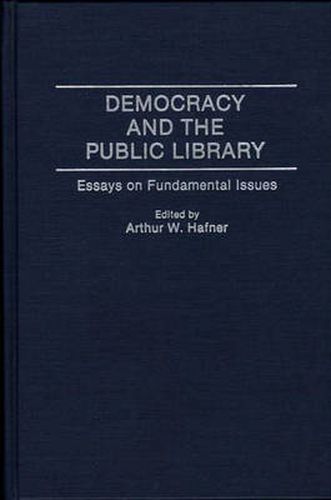Readings Newsletter
Become a Readings Member to make your shopping experience even easier.
Sign in or sign up for free!
You’re not far away from qualifying for FREE standard shipping within Australia
You’ve qualified for FREE standard shipping within Australia
The cart is loading…






The free exchange of ideas is central to any democracy, and libraries are central to the free exchange of ideas. Hafner examines many of the issues at the heart of the library’s role in a democratic society and demonstrates the practical importance of the library’s democratic mission. In order to make informed decisions about acquisitions, librarians must be familiar with the legal and intellectual debates surrounding controversial material. The opening chapters of the volume provide an historical and theoretical context for the democratic role of the library by discussing issues related to canonicity. Later chapters discuss legal issues related to the library as a forum for free expression, the Richard R. Kreimer case, and the confidentiality of library records. Chapter authors thoroughly discuss issues that impact the daily functioning of the library. Their backgrounds in library and political science, law, management, sociology, and literary studies bring a fresh perspective to these controversial and hotly debated issues. The book will be of special interest to all practicing librarians, library trustees and administators, and to library science students.
$9.00 standard shipping within Australia
FREE standard shipping within Australia for orders over $100.00
Express & International shipping calculated at checkout
Stock availability can be subject to change without notice. We recommend calling the shop or contacting our online team to check availability of low stock items. Please see our Shopping Online page for more details.
The free exchange of ideas is central to any democracy, and libraries are central to the free exchange of ideas. Hafner examines many of the issues at the heart of the library’s role in a democratic society and demonstrates the practical importance of the library’s democratic mission. In order to make informed decisions about acquisitions, librarians must be familiar with the legal and intellectual debates surrounding controversial material. The opening chapters of the volume provide an historical and theoretical context for the democratic role of the library by discussing issues related to canonicity. Later chapters discuss legal issues related to the library as a forum for free expression, the Richard R. Kreimer case, and the confidentiality of library records. Chapter authors thoroughly discuss issues that impact the daily functioning of the library. Their backgrounds in library and political science, law, management, sociology, and literary studies bring a fresh perspective to these controversial and hotly debated issues. The book will be of special interest to all practicing librarians, library trustees and administators, and to library science students.